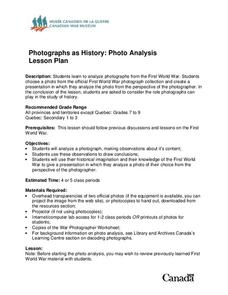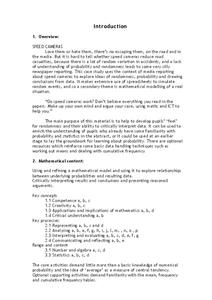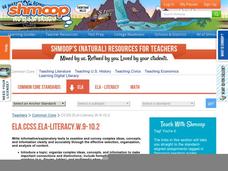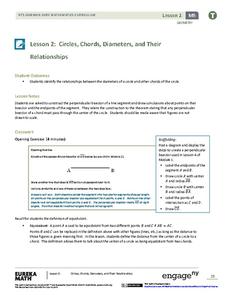Curated OER
Living in a Geometrical World
Students participate in a series of hand-on, online, and multimedia activities to examine 2 dimensional and 3 dimensional shapes. They describe common geometric solids. They construct rectangular prisms using straws and ribbon.
Curated OER
Investigate Science Using Crayfish
Young scientists discover the importance of scientific investigation by observing live crayfish. They carefully observe the patterns of crayfish in different environments. Then they discuss their conclusions and define what all living...
Curated OER
Primary Sources and Protagonists: A Native American Literature Unit
Introduce your middle schoolers to the lives of past Native Americans. First, learners work together to put photographs in a sequence. Then, using their sequence, they create stories to share with the whole class. No matter how old your...
Curated OER
My Personal Wellness
Merge technology and wellness. Class members complete inquiry-based research on a personal wellness issue and create an annotated bibliography, uploading their completed work to their personal wellness websites. Prior to beginning, your...
Curated OER
Two Truths and a Lie: Internet Research Skills
It's tough for high schoolers to assess what is a credible resource and what is not. A helpful resource prompts class members to research a particular topic and record two facts—and create one lie—while documenting the sources. They then...
Curated OER
Simple Machines
Have your class conduct research to learn all they can about simple machines. They use the web, take notes from a video, write a script, then make a film describing various simple machines found in real life. These videos are then...
Illustrative Mathematics
Should We Send Out a Certificate?
Fred thinks his test score is high enough to earn him a certificate. Given the mean and standard deviation, use properties of normal distributions to calculate Fred's percentile ranking and see if he is right. Consider having your class...
Curated OER
Bering Sea Buffet - A Foodweb Activity
Life in the Bering Sea, food webs, and the ocean ecosystem are introduced with a map activity. The lesson starts as kids explore maps and images of the Bering Sea, then it kicks into high gear as they start to discuss the types of...
Foundation for Water & Energy Education
How is Flowing Water an Energy Source? Activity C
Can the force of falling water through a tube vary by altering the diameter of the tube or its height? That is what physical scientists aim to discover in this activity, the third in successively more revealing activities on the power of...
Canadian Museum of Civilization Corporation
Photographs as History
Imagine being a war photographer embedded in World War I. How do you see your role? How might your photos influence that study of the war? Of history? Class members select a photograph, adopt the perspective of the photographer, and...
G. Turrell
Science Activity 2: Light & Sound
Little learners experiment with sunlight and map out how light travels. Using a mirror and slotted card, they find out about items that can reflect or absorb the light. They experiment with a variety of materials to find out how light...
EngageNY
Logarithms—How Many Digits Do You Need?
Forget your ID number? Your pupils learn to use logarithms to determine the number of digits or characters necessary to create individual ID numbers for all members of a group.
Inside Mathematics
Snakes
Get a line on the snakes. The assessment task requires the class to determine the species of unknown snakes based upon collected data. Individuals analyze two scatter plots and determine the most likely species for five additional data...
Bowland
Speed Cameras
Do speed cameras help reduce accidents? Scholars investigate this question using a series of spreadsheet activities. Along the way, they learn about randomness, probability, and statistical analysis.
EngageNY
Angle Sum of a Triangle
Prove the Angle Sum Theorem of a triangle using parallel line and transversal angle relationships. Pupils create a triangle from parallel lines and transversals. They find angle measures to show that the angles of a triangle must total...
University of North Carolina
Sciences
Science writing follows many of the same principles as writing in language arts, but some structural details differ. Individuals read an online science handout that covers how to write with precision, choose appropriate details, and use...
Curated OER
World War II - War Comes to Hawaii
Ninth graders use geographic representations to organize, analyze, and present information on people, places, and environments. They use tools and methods of geographers to construct, interpret, and evaluate qualitative and quantitative...
Curated OER
Budget Making
Students develop a budget for spending and saving. In this economics lesson, students create a budget based on personal, family and government income. They discuss jobs at home and allowances. They discuss how they manage their money...
Middle Tennessee State University
A House Divided: The Civil War Home Front in Tennessee
To broaden their understanding of both the short term and long terms effects of the Civil War, class groups examine primary source materials and then assume the role of a family member and draft a letter to a soldier describing life at...
Shmoop
ELA.CCSS.ELA-Literacy.W.9-10.2
The details in the new Common Core standard for producing informative/explanatory texts is different from what you have in your current curriculum, and now you are confused on what to do. Keep calm and carry on, because not only does...
Arizona Department of Education
Area and Perimeter of Regular and Irregular Polygons
Extend young mathematicians' understanding of area with a geometry lesson on trapezoids. Building on their prior knowledge of rectangles and triangles, students learn how to calculate the area of trapezoids and other irregular...
EngageNY
Circles, Chords, Diameters, and Their Relationships
A diameter is the longest chord possible, but that's not the only relationship between chords and diameters! Young geometry pupils construct perpendicular bisectors of chords to develop a conjecture about the relationships between chords...
Inside Mathematics
Marble Game
Pupils determine the theoretical probability of winning a game of marbles. Individuals compare the theoretical probability to experimental probability for the same game. They continue on to compare two different probability games.
Do2Learn
Social Skills Card Game
Encourage social skills including listening, speaking, and taking turns with a card game that challenges scholars to discuss topics and summarize in groups of four.
Other popular searches
- Nonfiction Draw Conclusions
- Draw Conclusions in Reading
- Draw Conclusions Lesson
- Draw Conclusions Reading
- How to Draw Conclusions
- Infer and Draw Conclusions
- Draw Conclusions in Literacy
- Draw Conclusions in Fiction
- Fiction Draw Conclusions
- Draw Conclusions Worksheet

























